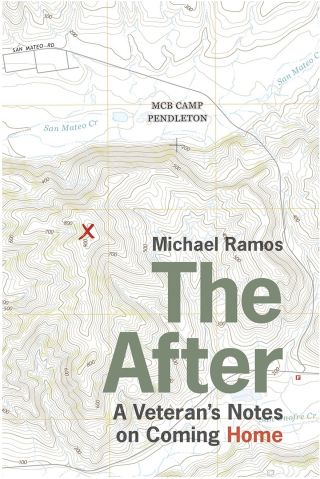Emotions
A Soldier's Perspective
New book offers one veteran's insight about military service—and coming home.
Posted August 5, 2024 Reviewed by Monica Vilhauer

In The After: A Veteran's Notes on Coming Home, Iraq War veteran Michael Ramos offers an intimate—and forthright—view of his life as a soldier and his struggles returning home. In this interview, Ramos expands on the book's depiction of a soldier's emotional experience.
Jason Tougaw: In the book’s preface, “Comm Check," you thank civilians: “thank you for reading, thank you for being curious about my experience, and thank you for being someone worth serving for.” In the rest of the book, you address an audience with military experience. Why did you want to start the book this way?
Michael Ramos: Years ago, I was in a workshop and one of my classmates said they weren't sure if they were allowed to laugh at some of the things they were reading. I also was getting feedback that my writing was angry and it scared people. So the first reason I wrote "Comm Check" was as a chance to invite readers to laugh and walk with me as I journey through returning and assure my reader that I am not necessarily angry with them as people. It also served as an invitation to come behind the curtain, so to speak—and that I would be the civilian reader's guide through a world that may be foreign to them. The second reason for "Comm Check" was artifice. It allowed me to bookend The After with the narrator in the present in the beginning, prep my reader for the weirdness of time and the fragmented narrative, then come back to the narrator in the present in the final piece as anchor points.
JT: Following up on the audience question, why was it important to you to imagine an audience with military experience?
MR: I wanted other men and women who have served to realize they aren't alone. One of the things we say to each other is that people just don't understand, so I thought that if I write this from my own perspective as a veteran, then people could say “at least someone gets me.” I think too, that I wrote it for the military again as craft, to treat my civilian readers as intelligent adults who could piece together through context clues what I was saying and to spark discussion between veterans and civilians.
JT: Your style is fast-paced, even staccato, and your voice is intimate. How did you land on the book’s style?
MR: I thought a lot about how in a Marine unit we speak to one another, the cadence of language, and wanted to replicate that on the page—that sense of urgency and movement comes across in the syntax and speed of language. The voice is one I used with my Marines and docs and as a writer I chose to keep that intimate style so the civilian reader, while intimidated by the language and learning curve of terms and culture, would at least see my narrator’s vulnerability and honesty.
JT: Early in the book, you write, “I don’t usually tell war stories because most people won’t understand—won’t being a choice—or maybe they can’t, because here where everyone is so far from death, everything is so polite and civilized and vets are so uncivilized. Our speech and actions don’t mesh with everyone else’s, and rather than being judged or called racist or misogynist or whatever else, we won’t tell our war stories for the sake of telling war stories.” Why did you decide to tell your story in the form of a book?
MR: I felt misunderstood and unwelcome, but want to be understood and welcome. So The After is, in a sense, an attempt at communicating. If you'll allow the extended comm metaphor, I am keying the handset on a radio and sending my traffic even if it comes in broken and unreadable in the hopes that someone somewhere will hear my transmission and read (understand) me—as we would say. Part of my job as a writer is to explain the things that are unexplainable, to try and make sense of the confusing and nonsensical. And lastly, I know there is an irony in saying "I don't usually tell war stories," and then telling one. But I made a choice to write about them in the book in the hopes that telling them will make the reader feel heard if they are military. If the readers are civilians, I hope they feel like they are being let into a circle they are usually excluded from. I don't mean to say that in a deigning-to-let-you-in way but more of you-should-see-this-because-we-are-still-part-of-society way, if that makes sense.
JT: For much of your military career, you were an RP, a Religious Program Specialist. What’s entailed with that job?
MR: RPs are enlisted, which I think is important to say because I am proud of my service as an RP. In garrison we had an expansive range of duties from advising the chaplain and managing sometimes large budgets to setting up for a variety of religious services.
In the field or in country, RPs were force protection. We escorted the chaplain as they made rounds, stood guard over services, and made sure the chaplain didn't get killed. We had to train with weapons, know some tactics and patrolling techniques, know combat first aid—I can use a tourniquet, treat various types of wounds, start an IV, for example—know how to use a radio, and drive a Humvee at a minimum. I remember scanning windows and doors and people looking for threats to him (the chaplain) and the Marines I was with anytime the chaplain and I were forward. An intangible and unspoken part of the job, too, is being proficient enough at the field stuff that Marines trust you and allow you to be in their circle. Marines don't give you anything, you have to earn it, and my Marines trusted me and counted me as one of their own, which was the highest praise I could imagine receiving.
JT: Throughout the book, you express frustration and anger about “outsiders” (people who haven’t served in the military)—the questions they ask, the assumptions they make, the tone of their interactions with you. What do you want non-military readers to learn?
MR: I haven't had a negative interaction in a while. I guess I just wish people would recognize that service members are people and that service generally didn't break or destroy us. That we are really well-trained at admin and operations and logistics and leadership and have so much to give back to our communities and we want to give back and flourish back home. That most of us aren't special operators with a wide variety of ways to kill someone. It cracks me and my wife (also an Iraq veteran) up when people talk about military grade and military training. Most of us military folks are more proficient at using a mop or a computer than a weapon.
So really, I want folks to just see us as people, and take the time to have a relationship with us and listen to us when we are comfortable enough to talk. Take the creative writing department I am in at UNC Wilmington. My colleagues never made me feel like a monster or a freak. They see my love for them and our community and my passion for art and service and accept me as I am and I would like to think I am thriving there partly because of how they treat me. It comes down to community and being made to feel welcome and respected without falling over themselves, if that makes sense.
JT: Is there anything else you’d like people to know about The After?
MR: I'd like people to know that this is my story, not the story even if people I served with and people I didn't serve with can relate. What I tell in The After are things I decided to tell to construct a narrative, not that I withheld anything or changed details for nefarious purposes, but this is art from my perspective. And even though it took about ten years or so to write and publish, this isn't the last word or only word on the subject of homecoming, even from me.




